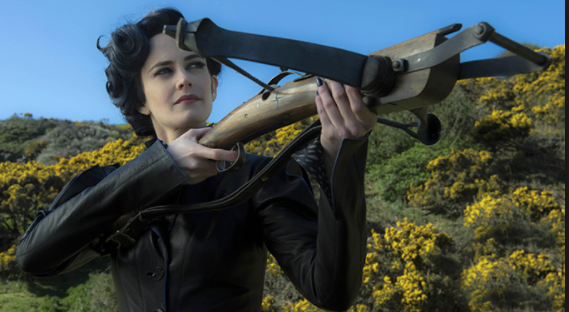“Ever felt like nothing you do matters?” For Jake Portman (Asa Butterfield), this question is one that weighs heavily as he spends his days in average freakdom while working as a stockboy at Smart-Aid (Rite-Aid clearly didn’t want to take advantage of the advertising). Invisible to those at his school, Jake finds more common ground with his aging grandfather, Abe (Terence Stamp), than the open-mouthed non-peculiars of his Florida town.
In the middle of his shift, Jake is called upon to go to Abe’s house. When his co-worker asks why his own father, Franklin (Chris O’Dowd), couldn’t do it, Jake replies that he’s busy working. His co-worker retorts, “I didn’t think he had a job.” This is the first glimpse into the aloofness Franklin possesses toward his patriarch, one that Jake has witnessed in frustration since childhood.
As Jake’s co-worker pulls up to the house, the sight of an irisless, homeless looking man, Dr. Barron (Samuel L. Jackson), shakes them, and is a natural omen of something worse to come. And yes, as expected, Abe has gone missing amid overt signs of a scuffle. When Jake retrieves him from the woods with his eyes missing from their sockets (eyes get a lot of gross play throughout Miss Peregrine, equally as memorably iconic as certain scenes from The Neon Demon and Kill Bill Vol. 2), Abe has a cryptic message to deliver. Phrases like “find the bird” and “September 3, 1943” mean little to Jake, who is still far too enmeshed in the temporal nature of normal reality to process anything even remotely surreal.
Written by Jane Goldman, known for her witty action scripts (e.g. Kick-Ass) and being married to Jonathan Ross, Miss Peregrine’s Home for Peculiar Children is adapted from Ransom Riggs’ debut novel with a meticulousness that suits Tim Burton’s directorial style–not to mention, of course, the frequently macabre nature of the narrative. For instance, one of the children in the home, Enoch (Finlay MacMillan), is gifted with the ability to make inanimate objects and even people come to life for a brief period of time. This leads to a scene that harkens back to Burton’s earlier work, unafraid of the sinister and unapologetic of the outright grisly.
Nods to Edward Scissorhands rest in the animal shapes of the children’s home hedges, while the sheer emotionalism of the characters’ interconnectedness compares with Big Fish, both in the execution and feelings evoked.
Eva Green, who plays the eponymous character, is often secondary to the likes of Jake and his love interest, Emma Bloom (Ella Purnell), who can control air, but must, resultantly, be bogged down by extremely fashionable lead shoes in order not to float away. Still, Green uses her mercurial aura and iciness to the advantage of a Tim Burton character, wielding just the right amount of kitsch and Halloween costume imitability. Furthermore, I think we all know she took aesthetic inspiration from Betty Draper shooting pigeons for one of her own now illustrious scenes taking out a Hollow (hulking creatures that only Abe and Jake have the ability to see).
And then there is Dr. Barron, played with the villainous comicality that only Samuel L. Jackson could infuse the role with. On an endless quest to secure eternal life while still maintaining a modicum of humanity, Dr. Barron is the leader of a faction of peculiars called The Wights, who broke away from the original peculiars in protest against being unable to exist outside of time loops while still remaining immortal. Barron’s delivery of such lines as “I pretended to be a psychiatrist in Florida for three months. Have you ever been to Florida?” adds just the right touch of hilarity to his antagonism.
Apart from the refreshingness of seeing Burton take his talent to a pastoral out of doors setting–and in Wales, no less (it used to be Submarine was the only contemporary movie you could name set in that country)–he appears to be cleansing himself of the hyper-Hollywood, misappropriatedly budgeted Alice in Wonderland and Alice Through the Looking Glass. Whether this is a result of the source material for his script or simply realizing that he should stop giving so much of a fuck about securing mass appeal, Burton has come back to life, and maybe it’s not a coincidence that shedding himself of former muses Johnny Depp and Helena Bonham Carter coincides with a reinvigorated era of his filmmaking. After all, if one takes their cues from one of the oldest living auteurs, Woody Allen, it’s necessary to change up muses at least every five years.




















